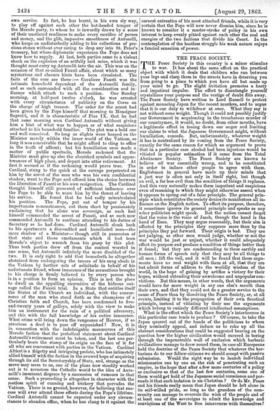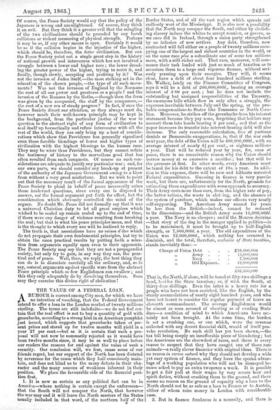THE PEACE SOCIETY. T IIE Peace Society in this country is
a minor stimulus to war. It has about the same effect on the practical What is the effect which the Peace Society's interference in this particular case tends to produce ? Of course, to take the Japan quarrel out of the hands of the politicians to whom they nominally appeal, and induce us to rake up all the abstract considerations that could be suggested bearing on the question how the higher civilization would succeed in boring through the impenetrable wall of exclusion which barbaric civilizations manage to draw round them, in case all Europeans held the doctrine of the Peace Society that whatever the bar- barians do to our fellow-citizens we should accept with passive submission. Would the right way be to launch individual missionaries one by one on the risk of penetrating such an empire, in the hope that after a few more centuries of a policy as exclusive as that of the last few centuries, some one of them would get hold of the Japanese social conscience and per- suade it that such isolation is nn-Christian? Or do Mr. Pease and his friends really mean that Japan should be left alone in its self-willed pride, so long as the grandees of the com- munity can manage to overrule the wish of the people and of at least one of the sovereigns to admit the knowledge and convictions of the West to free intercourse With themselves? Of course, the Peace Society would say that the policy of the Japanese is wrong and unenlightened. Of course, they think it an evil. But they think it a greater evil that the mingling of the two civilizations should be preceded by any harsh collisions or violent measuring of physical strength. Perhaps it may be so, if any other means is open. Certainly it would be so if the collision begins in the injustice of the higher, which should be, therefore, the better civilization. But can the Peace Society point out a single great step in the history of national growth and intercourse which has not involved a struggle between a lower and higher race ; the lower dread- ing the greater power of the higher, trying to resist it, and finally, though slowly, accepting and profiting by it? Was not the invasion of Judea itself, —the most striking act in the education of the chosen people,--the type of all such move- ments? Was not the invasion of England by the Normans the root of all our power and greatness as a people ? and the invasion of the Romans by the Goths,—though then the form was given by the conquered, the stuff by the conquerors,— the root of a new era of steady progress ? In fact, if once the Peace Society divert our attention, as they always must do, however much their well-known principle may be kept in the background, from the particular justice of the war in question to the abstract right of any form of civilization to seal itself up hermetically and refuse intercourse with all the rest of the world, they can only bring up a host of conside- rations which show that Providence has generally signalized even these forcible blendings of lower and higher types of civilization with the highest blessings to the human race. They may be wiser than Providence, but they cannot refute the testimony of history to the marvellous good that has often resulted from such conquests. Of course no such con- siderations arc adequate to justify any particular war ; and, for our own parts, we should consider any break-up at present of the authority of the Japanese Government owing to a blow from without a very great misfortune. But we wish to point out that the necessary result of the formal appearance of the Peace Society to plead in behalf of peace necessarily raises these irrelevant questions, since every one is disposed to answer, not the formal argument put forth for effect, but the consideration which obviously controlled the mind of the arguer. No doubt Mr. Pease did not formally say that it was a universal Christian duty to let all great empires which wished to be sealed up remain sealed up to the end of time, if there were any danger of violence resulting from breaking the seal ; but that is what his peace principles mean, and that is the thought to which every one will be inclined to reply. The truth is, that associations have no raison cl-etre which do not propagate their own fundamental principles, but try to obtain the same practical results by putting forth a selec- tion from arguments equally open even to their opponents. The Peace Society may say that they are not a propagandist society, but only try to gain, in any way they can, the prac- tical end of peace. Well, then, we reply, the best thing they can do is to dissociate carefully all the ordinary, and, so to say, natural, arguments against specific wars from the abstract Peace principle which so few Englishmen can swallow ; and this they only adequately do by dissolving themselves. Soon may they exercise this divine right of abdication !































 Previous page
Previous page